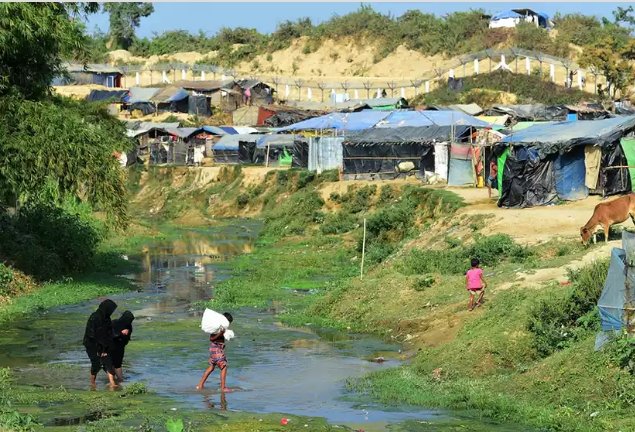
young lady wearing pink, perhaps three years of age, is grinning through a tear in a covering. She is inclining toward the bamboo post holding up her home. Beneath her is a 15-foot drop, straight down to a became scarce riverbed.
The precarious valleys over the immense Rohingya displaced person camps are a developing worry as Bangladesh's rainstorm season approaches. The previous summer, when countless Rohingya fled over the outskirt from Myanmar even with a claimed genocide, the Bangladesh government designated state-possessed land for their camps.
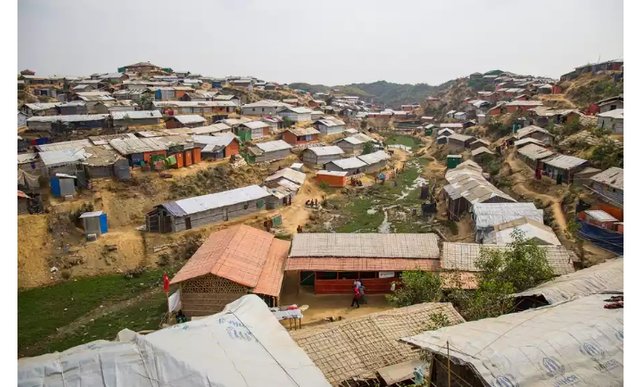
The land was Bangladesh's hold backwoods: wonderful, thick, lavish forest that extended for miles over the south of the nation.
Inside a couple of months, the backwoods was stripped away totally, leaving just compacted residue that crumples to tidy at a touch. Bangladesh's storm season will soon start, with long stretches of rain. Twisters can hit the nation whenever amongst March and July.
"I am extremely stressed over the storm," says Mohammed Rofik, 27. "It was sufficiently hard in Myanmar, where we had great houses. Those houses would get pulverized by the tempests. Here, we have houses made of plastic and bamboo."
The speed of the Rohingya movement over the outskirt last August shocked guide offices. Accordingly, a huge number of homes were worked out of simply canvas and bamboo. "Lives will be lost," says one guide specialist. "The houses at the highest point of the slopes are in danger of avalanches, the ones at the base could surge."
One evaluation, completed by Dhaka University and the UN High Commissioner for Refugees, the UN displaced person office, recommends that up to 33% of the settlement zone could be overwhelmed, with more than 85,000 outcasts losing their havens. Another 23,000 displaced people living on soak inclines could be in danger of avalanches.
As a result of its area at the highest point of the channel formed Bay of Bengal, Bangladesh is particularly defenseless against twister harm. In 1970, a violent wind murdered up to 500,000 individuals.
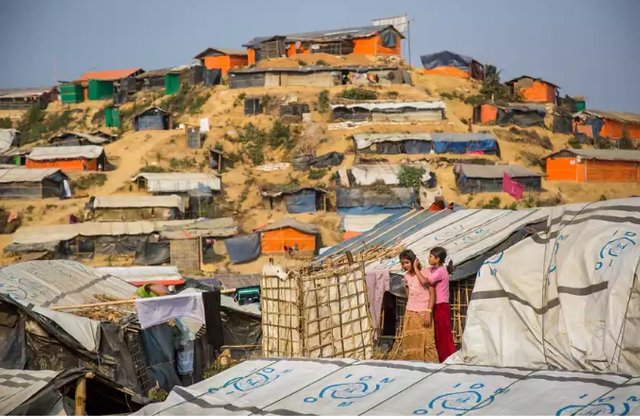
As help organizations race to decrease the rainstorm hazard, they confront different challenges. Sheik Hasina, Bangladesh's PM, has confronted huge feedback for permitting right around 700,000 displaced people into southern Bangladesh a year ago, and the Rohingya have not been allowed formal status as exiles.
With a general race approaching in Bangladesh toward the finish of this current year, the administration is demanding that the camps are not a lasting nearness. This is confounding rainstorm arranging.
A couple of block streets and solid channels have been worked as of late, yet help organizations are restricted from making long haul arrangements. The organizations are developing bamboo connects, and giving out sandbags.
This additionally implies as opposed to building schools, help offices can just make "youngster well disposed spaces".
Romida, 13, who touched base from Burma around a half year back, said she needed to take in more. At a kid amicable space keep running by Brac, a Bangladeshi philanthropy, the youngsters are just permitted to sing tunes in their local dialect. They are prohibited from learning Bengali, to guarantee that they will never have the capacity to incorporate with local people.
There are around 900,000 Rohingya in Bangladesh right now, concurring to UN exile organization figures, with about 212,000 in the nation even before the emergency the previous summer.
A portion of the camps in southern Bangladesh have existed since the mid 90s, which means anybody younger than 25 has never lived outside a displaced person camp.
"I need a decent training and a great job," says Romida. "I am terrified I will spend as long as I can remember in an exile camp."
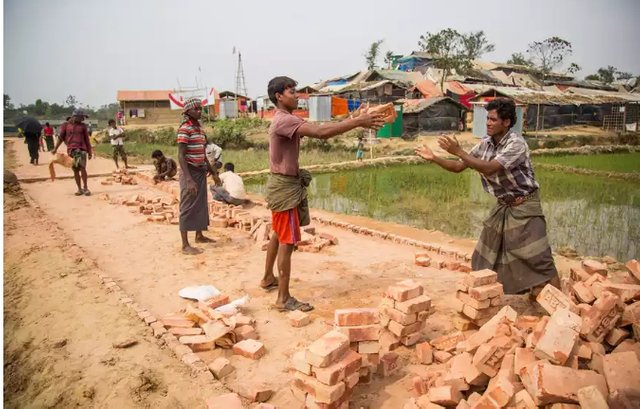
Madrasas – Islamic learning focuses – are filling the instructive void. Everywhere throughout the camps, kids were assembled, droning the Qur'an. The mosques, the most unequivocally manufactured developments in the camps, may turn out to be a piece of storm arranging.
Not at all like a large number of the world's displaced person camps, the Rohingya people group are not fenced, which is additionally making worries among nearby Bangladeshis. The region around the camps is poor and country. Displaced people are given a settled measure of rice, lentils and cooking oil each month, with numerous offering the surplus on the underground market. Accordingly, the cost of rice, a key nearby deliver, has crumpled alongside the cost of work , causing outrage among local people.
Fuel for cooking stoves isn't dispersed, so youngsters are strolling miles to accumulate kindling for the families. The proceeded with deforestation of the zone rankles local people, while woods visits represent another hazard for outcasts, since the hold timberlands used to be home to many wild elephants – some of which stay in the region. A month ago, an evacuee was killed and various individuals harmed when an elephant stomped a few shacks.
"Every one of the youngsters need to walk far to get fuel," says Rofik. "The Bangladeshis yell at them, letting them know not to take it, but rather we don't realize what else to do."
Over Romida's head, in a kid cordial space, a transcribed blurb features another risk confronting evacuees.
"Try not to go to the can alone during the evening," it says. "Group administrations are free. You will never be requested favors for them."
A few exiles say individuals have been trafficked out of the camps.
"I have heard that individuals result in these present circumstances camp and take the kids. Two kids were gone up against F piece. We go to the latrine together around evening time, and we remain together, so we are never alone," says Shamshida, 35.
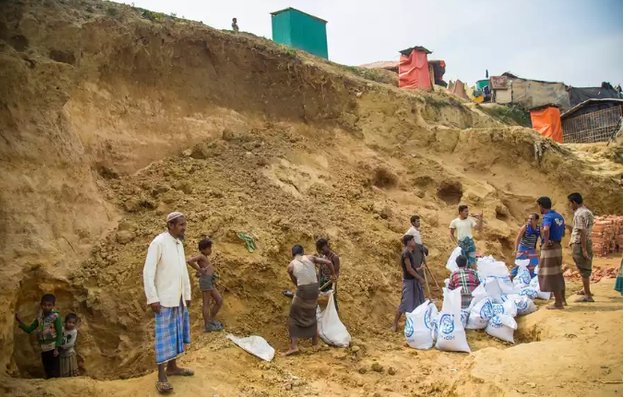
The Rohingya have additionally confronted inquiries as of late, with feedback of a portion of the stories about the charged genocide. The Rohingya need compassionate guide to keep on flowing to the camps, and know that stories of their predicament will keep the guide coming. At a tyke benevolent space, likewise keep running by Brac, an eight-year-old young lady clarifies that it took a five-day stroll to get to the camp, however that her family were currently cheerful to be in Bangladesh.
"I am extremely glad to be here, in light of the fact that in Myanmar we need to pay for everything," she says. "Yet, here everything is free."
The Rohingyas had confronted a long time of destitution and hardship in Myanmar. Diphtheria, a sickness totally killed in Bangladesh by routine immunizations, has cleared through the camp as of late. Indeed, even before the mass migration, instruction was poor among the Rohingya, with elevated amounts of lack of education.
Dr Rifat, working at a facility, says the education rate was dangerous. He needed to make a framework to guarantee moms give the right pharmaceutical to the right youngster.
"I draw images on the bundle, two pills, twice every day, for instance," he says. "And after that I attach a lace to the bundle, and a strip round the wrist of the kid. At that point the mother knows the blue bundle runs with the youngster wearing a blue lace."
He severs from the meeting to control a mother and infant far from the long line for administrations in the center, directing her rather to a fundamental segregation region.
"That infant seems as though it might have measles," he clarifies. "We would prefer not to aggravate things any. We are attempting our best to improve things."
Many evacuees gave nitty gritty depictions of their excursions to Bangladesh, portraying how their towns had been assaulted over and over by Myanmar civilian armies. In the previous week, more film has risen up out of Myanmar proposing that endeavors are being made to cover up mass graves.
Talking through an interpreter, Karim Ullah, from northern Rakhine, says 25 individuals were murdered in an assault on his town, with a further 38 truly harmed.
He is hindered by a man in the group, talking in his local dialect: "Disclose to them that your sisters were assaulted," says the man.
"No," Karim says in an aside. "That did not occur in my town."
He proceeded with his point by point account, saying that the Rohingya required ID cards and assurance from retaliations.
"I need equity," says Karim. "All that we had is left in Myanmar. Everything
many mountain are destroyed...
Downvoting a post can decrease pending rewards and make it less visible. Common reasons:
Submit
yes. you are right that's very harmful for us.
Downvoting a post can decrease pending rewards and make it less visible. Common reasons:
Submit
This post has received a 20.00 % upvote from @voterunner thanks to: @abir2016. BIG NEWS: Build your passive income with daily payouts from @voterunner! Read more about earning SBD with me. Daily. The easy way!
Downvoting a post can decrease pending rewards and make it less visible. Common reasons:
Submit